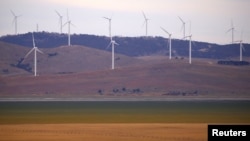Australia said Thursday it is not on track to reach its target of obtaining 82% of its power from renewable sources, including wind, solar, batteries and hydroelectricity by 2030.
Renewable sources now account for about 35% of Australia’s electricity.
Government hopes of bringing the number up to 82% by 2030 are not on track, according to Chris Bowen, the minister for climate change and energy.
He told local media Thursday progress is too slow, planning regulations are often too strict and that private investment in green energy plans is stalling.
The Clean Energy Council, which represents solar, wind and other renewable power companies, has said the first six months of 2023 marked the slowest start to a year for financial certainty on major green energy projects since 2017.
In response, the government Thursday said it intends to significantly expand a taxpayer-funded initiative to subsidize and underwrite new clean energy projects.
Coal and gas continue to dominate Australia’s energy sector, generating most of its electricity. As the country moves away from fossil fuels, though, there are concerns about instability in the power system during the shift to renewables.
Bowen told the Australian Broadcasting Corporation Thursday that he plans to get the country’s green energy commitments back on track.
“Coal-fired power stations - the workers are doing a great job keeping them operating and running - but they are getting older, and we have got a massive pipeline of renewable energy investment in Australia, but we want it moving to final investment decision more quickly and we want it making its way through the planning systems more quickly,” Bowen said.
Australia has legislated a target to cut carbon emissions by 43% from 2005 levels by 2030 and to achieve net zero emissions by 2050.
The aim to supply 82% of the nation’s power needs with renewable sources by 2030 is not mandated by law.
Bowen is expected to represent Australia at annual United Nations climate talks in Dubai. Those talks begin next week.
Before Bowen leaves for the summit, he is scheduled to give an annual climate change statement to the Federal Parliament in Canberra next week.
Australia’s per capita emissions from coal in 2022 were more than four times the international average according to Ember, a British clean energy research organization.




